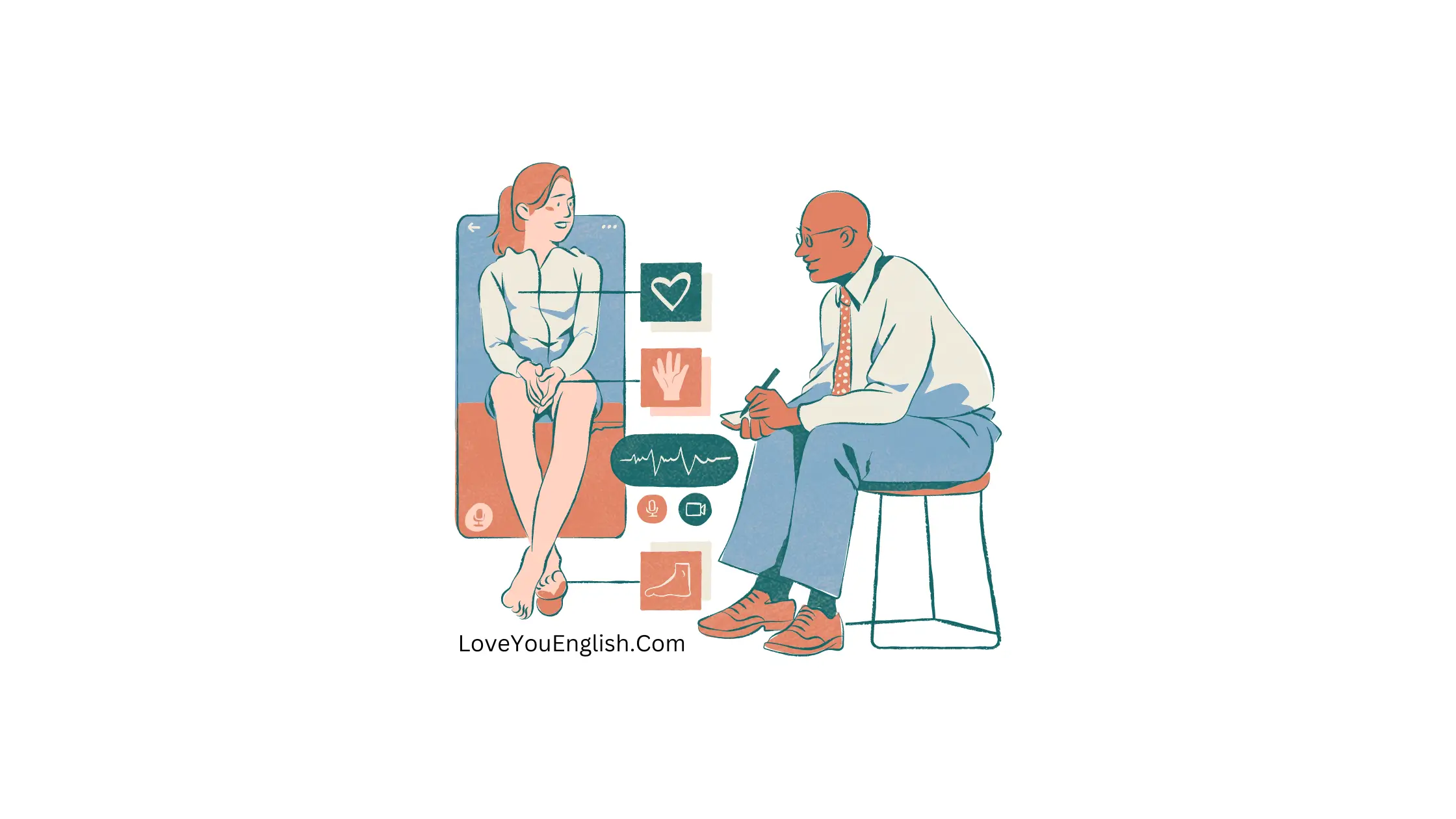English Dialogues Practice: The Doctor’s Office
English Conversation-1: At the Doctor’s Office
Doctor: Hey there, how are you doing today?
Patient: Hey doc! I’ve been better, to be honest. I’ve got this pounding headache that just won’t quit.
Doctor: Oh no, sorry to hear that. Let’s see what we can do. Have you been experiencing any other symptoms along with the headache?
Patient: Yeah, I’ve been feeling really tired lately, and my throat has been a bit scratchy too.
Doctor: Okay, let me take a look. Open up and say “ahh.”
Patient: “Ahh.”
Doctor: Hmm, your throat does look a bit red and swollen. And I can see why that headache would be bothering you. It sounds like you might have a sinus infection.
Patient: Really? What should I do about it?
Doctor: I’ll prescribe you some antibiotics to clear up the infection. And in the meantime, you can take some over-the-counter pain relievers for the headache. Make sure to drink plenty of fluids and get lots of rest too.
Patient: Got it, doc. Thanks for the advice.
Doctor: No problem at all. If you have any questions or if your symptoms get worse, don’t hesitate to give me a call.
Patient: Will do. Thanks again, doc.
Doctor: Take care, and feel better soon!
Patient: Thanks, I’ll try. See you later, doc.
Read more conversations:
- Daily English Dialogues Practice
- English Dialogue: A Friendly Social Event
- English Dialogues Practice: At the Coffee Shop
- English Dialogues Practice: At a Wedding
- English Dialogues Practice: Casual Talk
English Conversation-2: At the Doctor’s Office
Doctor: Hi there! How can I help you today?
Patient: Hey doc! I’ve been feeling really run down lately, and I’ve got this nagging pain in my stomach.
Doctor: I’m sorry to hear that. Let’s figure out what’s going on. Can you describe the pain for me?
Patient: It’s a dull ache, kind of in the lower part of my abdomen. Comes and goes throughout the day, but it’s been pretty persistent for the past week or so.
Doctor: Okay, I see. Have you noticed any changes in your appetite or bowel movements?
Patient: Yeah, my appetite’s been a bit off, and I’ve been a little constipated too.
Doctor: Got it. I’m going to do a quick examination to see if I can pinpoint the cause of your pain.
Patient: Sure thing, doc.
[Doctor conducts examination]
Doctor: Based on what I’m seeing, it’s possible you have a mild case of gastritis. It’s inflammation of the stomach lining, which can cause the symptoms you’ve been experiencing.
Patient: Oh, okay. What should I do about it?
Doctor: I’ll prescribe you some medication to help reduce the inflammation and relieve your symptoms. In the meantime, stick to bland, easy-to-digest foods and avoid spicy or acidic foods that might irritate your stomach further.
Patient: Will do, doc. Thanks for the help.
Doctor: No problem at all. If your symptoms don’t improve or if they get worse, don’t hesitate to come back and see me.
Patient: Sounds good. Thanks again, doc.
Doctor: Take care, and I hope you feel better soon!
Patient: Thanks, I appreciate it. See you later, doc.
English Conversation-3: At the Doctor’s Office
Doctor: Hey there, what brings you in today?
Patient: Hi doc, I’ve been feeling really fatigued lately, and I’ve been having some chest pain too.
Doctor: I’m sorry to hear that. Let’s get to the bottom of it. How long have you been experiencing these symptoms?
Patient: It’s been going on for about a week now. The fatigue has been really affecting my daily activities, and the chest pain worries me.
Doctor: Understandable. Let’s start by checking your vitals and doing a quick examination.
[Doctor checks the patient’s vitals and conducts an examination]
Doctor: Alright, your vitals seem stable. Now, let’s talk about your chest pain. Can you describe it for me?
Patient: It’s a sharp pain, mostly on the left side of my chest. It comes and goes, but it’s been pretty consistent over the past few days.
Doctor: Okay, I want to rule out any serious issues. I’ll order an EKG and some blood tests to get a better idea of what’s going on.
Patient: Sounds good, doc. What about the fatigue?
Doctor: Fatigue can be a symptom of various underlying conditions, so we’ll need to wait for the test results to determine the cause. In the meantime, make sure you’re getting plenty of rest and staying hydrated.
Patient: Got it. Thanks, doc.
Doctor: No problem. Once we have the results, we’ll discuss the next steps. If the chest pain worsens or you experience any other concerning symptoms, don’t hesitate to seek medical attention immediately.
Patient: Will do. Thanks for your help, doc.
Doctor: Take care, and I’ll be in touch soon with the results.
Patient: Thanks, doc. See you later.
English Conversation-4: At the Doctor’s Office
Doctor: Hello there! How are you feeling today?
Patient: Hi doc, I’ve been having some trouble with my allergies lately. My nose has been stuffy, and I’ve been sneezing a lot.
Doctor: I’m sorry to hear that. Allergies can be quite bothersome. How long have you been experiencing these symptoms?
Patient: It’s been going on for a couple of weeks now. I’ve tried over-the-counter allergy medications, but they don’t seem to be helping much.
Doctor: I see. Let’s see if we can find a better solution for you. Have you noticed if anything specific triggers your allergies?
Patient: Well, it seems to get worse when I’m around pollen or when I’m in dusty environments.
Doctor: That’s helpful information. I’ll prescribe you a stronger antihistamine to help alleviate your symptoms. In addition, I recommend keeping your living space clean, using an air purifier, and avoiding exposure to allergens as much as possible.
Patient: Thank you, doc. I’ll give those suggestions a try.
Doctor: You’re welcome! If your symptoms persist or worsen, don’t hesitate to give me a call. We can explore other treatment options if needed.
Patient: Sounds good. Thanks again for your help, doc.
Doctor: No problem at all. Take care, and I hope you start feeling better soon!
Patient: Thank you, doc. Have a great day!





